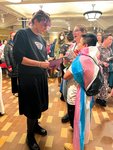


Minnesota’s transgender community and supporters packed the State Capitol for Transgender Day of Visibility on March 31, sending a clear and unapologetic message that reverberated throughout the rotunda: “You belong here.” The day came as an unprecedented number of bills targeting trans people have been introduced and enacted in states across the country this year and a week after the Minnesota House of Representatives passed the Trans Refuge Act.
Kat Rohn, executive director of OutFront Minnesota, said showing up is itself a powerful act. “Our visibility matters,” she said. “Because when we’re visible, when we show up in our communities as our whole, complex, messy, beautiful, amazing, authentic selves, we change the narrative that is being written about our lives.”
Lt. Gov. Peggy Flanagan said, “Trans people belong in Minnesota. You are safe here. And we want you to live your fullest and happiest and healthiest and most beautiful life possible here.”
Flanagan read a proclamation by Gov. Tim Walz designating March 31, 2023 as Transgender Day of Visibility. The proclamation celebrates trans, gender non-conforming, and non-binary Minnesotans while recognizing that trans people are disproportionately affected by hate crimes, violence and discrimination.
Rep. Leigh Finke (DFL-Saint Paul) knows all too well the political realities. Her bill passed in the House after a long, grueling night with a 68-62 majority – enough to win, but not enough to curtail the insults, slurs and damaging rhetoric that have become part of the public discourse. She spoke about the “shocking rate” and “terrifying number” of states where trans rights are being decimated. So much so, it prompted independent reporter Erin Reed (@ErinInTheMorning) to create a “risk map” that color codes in deep red the worst states for trans rights. These laws do far more than ban books and drag shows. In many states it is now illegal for teenagers and young adults to seek gender affirming care, and at least two states – South Dakota and Kentucky – direct health care providers to detransition youth.
“I can hardly utter those two words ‘forced detransition’ without succumbing to emotion,” said Finke. “They represent to me the final compromise that is being asked of our community: Will you choose the closet or the coffin? That’s the bargain of forced detransition.”
Governor Walz signed an executive order in March protecting the right of Minnesota’s LGBTQIA+ community members to receive gender affirming health care services. It also protects against extradition orders from other states where this care is no longer legal, making Minnesota a trans refuge state. To become permanent, however, the Trans Refuge Act needs to be signed into law. Finke said she is optimistic for the bill’s passage in the Senate.
“What we are fighting for is simple,” said Flanagan. “It is life affirming care. It is life saving care, and everyone deserves it.”
Pediatrician Dr. Katy Miller spoke of the positive outcomes of providing gender affirming care. “In my job, every single day I have the incredible honor of seeing trans youth thrive,” said Miller.
Miller mentioned a young patient she called “Mary,” who wanted to start estrogen therapy. Mary was at first shy and visibly uncomfortable – with her body and her life. She had been hospitalized for suicidal thoughts, which prompted her parents to bring her to the clinic for help. At her first follow-up visit after starting estrogen, Mary came in “absolutely beaming, face full of smiles.”
Miller said, “Over the course of the past three years, I have watched her grow into a confident and flourishing young adult. She is no longer the shy anxious girl who was trying to take up as little space as possible. She just exudes joy and light.”
Miller pointed out that gender affirming care is endorsed by every major medical society in the United States. The American Academy of Pediatrics, Endocrine Society, American Medical Association, American Psychiatric Association and American Psychological Association are among those organizations, according to the LGBTQIA+ media advocacy organization GLAAD.
Sharing Stories and Hope
Buoyed by the crowd, speakers shared deeply personal stories about their own transitions and offered messages of hope to others – especially to the youth in the room. For these speakers, visibility was everything. Most had had no experience with transgender and non-binary people as they were coming of age, no understanding of nor language to express it. They described sometimes long and painful journeys toward their own self discovery.
Looking upward at the crowd gathered on three levels of the rotunda, Rep. Alicia Kozlowski (DFL-Duluth) spoke of meeting for the first time – at 28 years old – Sharice Davids, an openly lesbian Native American congressperson from Kansas.
“That was a moment that catalyzed me to finally say out loud, ‘I’m gay, gay, gay.’ And everyone was like, ‘We know, we know, we know,’” said Kozlowski, drawing laughter from the crowd. “It took another five years to finally come home to myself fully as a two-spirit, nonbinary person.”
Mars Kamenski introduced himself as a Minneapolis resident, an immigrant from Bulgaria, an ancient soul who feels everything way too deeply, a gym rat “sans toxic masculinity,” a healer, writer, creator and dreamer – and someone who spent the first 29 years of their life living as a woman who now identifies as non-binary and trans masculine. Coming out as queer at 15 years of age in the “White, cisgender, heteronormative suburb of Rosemount” was damaging to Kamenski. He was bullied, assaulted and not accepted by people in his life. He repressed any introspection regarding his gender because it felt inaccessible and scary. In 2020, he began thinking critically about his gender, realizing that there was a great disconnect between who he wanted to be and who he presently was.
“I came to the epiphany that at the end of the day, the longest relationship that I’m ever going to have is going to be with myself. This was the wake-up call that I needed to step into my power and reclaim my life,” said Kamenski. “Starting testosterone has been one of the most healing experiences of my life. Witnessing the physical changes daily as I go through puberty all over again at 31 has been a wild experience to say the least.”
Kamenski addressed the youth in the room. “I want you to know how absolutely sacred you are. You are more than the laws they put forth trying to strip us of our rights. You are more than the news stories that they use to villainize us. You are more than the hate that people endorse to make themselves feel better about the things that they don’t understand,” he said. “You are powerful, you are beautifully unique, you are valid beyond measure, and you are worthy of everything that you want out of this life. No amount of darkness will overshadow your light.”
Danh Huynh, age 17, was raised in a conservative home where being queer was taboo. Huynh identified as queer from a very young age and had to endure being the only out queer person in school.
“Social media, reading and art really educated me and gave me inspiration to tap further into my queerness and femininity,” said Huynh, who wanted to let people of all ages in the LGBTQIA+ community know it is okay to be themselves.
“Normalizing being transgender is the first step we as a society need to take to improve not just the lives of trans people but the safety of our communities and neighborhoods as well,” said Huynh. “The validity, rights and care of trans people shouldn’t be a discussion… if you’re transgender and feel as if you aren’t enough, know that you are cared for, you are loved, and I care for you very much.”
Davin Sokup talked about his journey back to his hometown of Northfield as a trans man and becoming a city council member there. He doesn’t subscribe to the idea that trans people existing doesn’t impact anyone else’s life.
“Now that I’m back there as my full self giving back to my community in a way that feels right to me, I can see that my existence does affect those around me – and I want it to,” he said.
Performer and city of Minneapolis employee Andre Reed chose to speak out of a responsibility to show other Black trans people they can have productive careers and a family if they want to (Reed’s partner and one-year-old baby were at the event).
“The young, Black trans queer in me wants to encourage the young, Black trans queer in you to know that you can do and be whatever you want to be,” said Reed.
Luna Hernandez described herself as a proud Mexican woman of the trans experience and spoke of meeting an “angel” in her friend who took 68 years to finally become “Miss” Gloria. The two bonded over wigs and hair styling while enrolled in a treatment program. Hernandez attended as her authentic self, her first time presenting anywhere as such. After her 30 days were up, she couldn’t go back to her world as her true self and hid away. But then she remembered Miss Gloria saying, “Luna, now is the time. Do not live in regret.”
“I chose to live life authentically today because I don’t know any other way and because this is who I am,” she said.
“Now is the time.”
Comments
No comments on this item Please log in to comment by clicking here